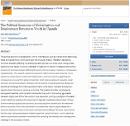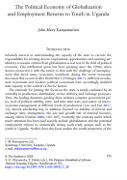| dc.contributor.author | Kanyamurwa, John Mary | |
| dc.date.accessioned | 2023-03-23T08:12:29Z | |
| dc.date.available | 2023-03-23T08:12:29Z | |
| dc.date.issued | 2020-06 | |
| dc.identifier.citation | Kanyamurwa, J.M. (2020). The Political Economy of Globalization and Employment Returns to Youth in Uganda. In: Oloruntoba, S.O., Falola, T. (eds) The Palgrave Handbook of African Political Economy. Palgrave Handbooks in IPE. Palgrave Macmillan, Cham. https://doi.org/10.1007/978-3-030-38922-2_20 | en_US |
| dc.identifier.uri | DOI: 10.1007/978-3-030-38922-2_20 | |
| dc.identifier.uri | https://hdl.handle.net/20.500.12504/1273 | |
| dc.description.abstract | The political economy of globalization, with its main features such as market-driven technology, trade, and capital flows, continues to alter the structure of labour markets in developing countries, adversely affecting vulnerable population groups such as the youth. Using a cross-sectional survey design in a study undertaken in Uganda, this chapter investigates the political economy of structural changes affecting the youth in the local labour market as a consequence of globalization. The research reveals how economic reforms have undermined the state’s capacity to create decent employment opportunities, with some results suggesting dire consequences ensuing from global competition, which indicate profound inequality, social exclusion, and extreme poverty. Moreover, prime evidence shows the youth are facing new transitional challenges from training establishments to the labour market as employment opportunities in the country continue to dwindle. This situation is further complicated by demographic realities, which currently indicate that the youth in the working age bracket represent slightly over 30% of the country’s total population, putting a spotlight on the state’s current inability to create youth employment in Uganda’s neoliberal policy context. Findings further emphasize globalization dynamics as constituting the authentication for weakened political structures, which are constrained in a situation that requires urgent response to economic distortions evident in the youth unemployment challenge. The study recommends that the state, taking advantage of isolated supportive market indicators, should spearhead reforms to promote sustainable interventions for correcting the skewed youth unemployment challenge in the local labour market. | en_US |
| dc.language.iso | en | en_US |
| dc.publisher | Springer International Publishing | en_US |
| dc.subject | Political economy | en_US |
| dc.subject | Globalization | en_US |
| dc.subject | Employment returns | en_US |
| dc.subject | Youths | en_US |
| dc.subject | Uganda. | en_US |
| dc.subject | Local labour market, | en_US |
| dc.subject | Youth unemployment challenge | en_US |
| dc.title | The political economy of globalization and employment returns to youth in Uganda | en_US |
| dc.type | Book chapter | en_US |


